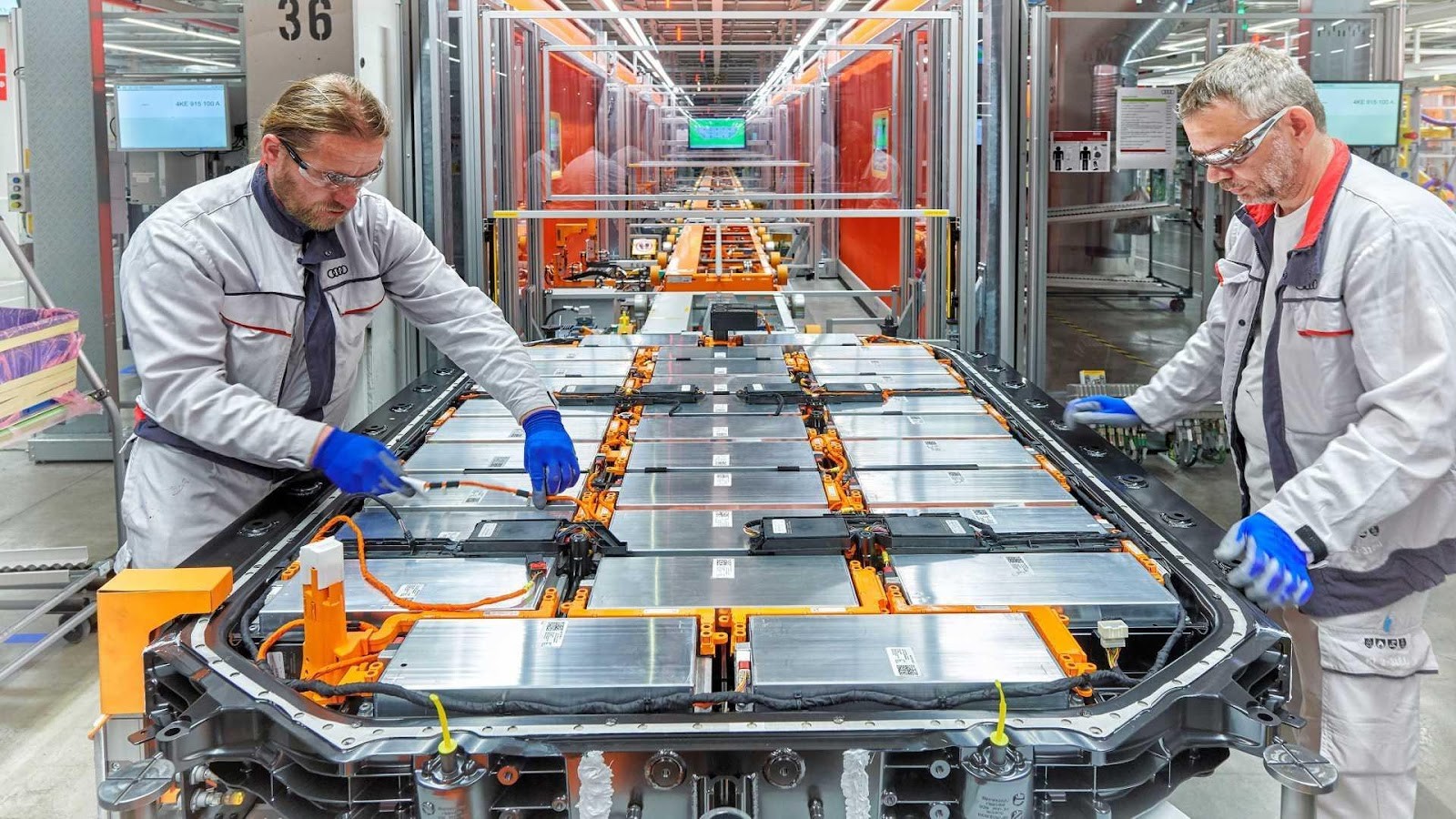
When choosing an electric vehicle, the potential owners are typically concerned about its range. However, one more important factor to consider is battery degradation, especially as the used EV market expands.
The majority of manufacturers provide a battery warranty of five to eight years. However, it is estimated that an electric car’s battery life is likely to serve you approximately 10 to 20 years before replacement is needed. Check this guide to find out the maintenance costs associated with an electric vehicle battery, what factors affect its life cycle, and how to extend it.
Explaining EV Battery Basics
To understand how an electric car works, it is crucial to be aware of its power source. There are four main types of batteries used in electric vehicles, namely:
- Lithium-ion
- Nickel-metal hydride
- Lead-acid
- Ultracapacitors
Here is a brief comparison of these battery variations:
| Lithium-ion | Nickel-metal hydride | Lead-acid | Ultracapacitors | |
|---|---|---|---|---|
| Life Cycle | + | - | + | - |
| Light Weight | + | + | + | + |
| Energy Efficiency | + | + | + | + |
| Affordability | + | - | + | - |
| Temperature performance | + | - | - | + |
Lithium-ion rechargeable batteries are commonly implemented in the manufacturing of electric cars due to the many advantages they feature, such as their portability, lightweight, and energy density.
A lithium-ion battery in an electric car looks like a box with individual AA battery-sized cells linked with software and circuitry. They accumulate energy as lithium ions pass through an electrolyte when moving from the negative electrode to the positive one during discharge and back when recharging.
Due to the increasing economies of scale, the costs of this battery technology have decreased by 97% since 1991. Experts predict that their price will reach a level low enough to compete with gas-powered vehicles by 2025.
Why Does an Electric Car Battery Lose Charge?
Lithium-ion batteries go through a cycle of charging and discharging when you connect your car to a power outlet and when you drive it, respectively. In the long run, this pattern has an inevitable impact on the battery capacity, resulting in a lower travel distance between recharges.
Find car finance deals with the best rates!
My monthly budget is
What Happens When the Battery Degrades?
The degradation of an electric car battery life is a process that implies a decrease in an EV’s energy storage and output. On average, batteries in modern cars lose approximately 2.3% of their original capacity annually.
The battery performance can be evaluated using the SoH (State of Health) parameter. It demonstrates how much energy in kWh the battery can deliver. In a new battery, SoH typically equals 100%, matching its specifications, but this figure decreases over time. The rate of reduction depends on a variety of operating conditions that we will discuss further in this guide.
All in all, battery degradation is nothing to be anxious about, just something to be aware of. Your EV will still remain drivable even when its battery performance is not at its best. On average, a replacement battery is only required when the degradation rate hits 50-65%. Besides, battery life decline is a fairly slow process. According to research, an average electric car owner only notices a 2% decline in battery power after three years of driving, while a 7% reduction is typically spotted after six years.
New Generation of Electric Car Batteries
The great news for EV enthusiasts is that Elon Musk is expected to launch a project for a brand-new generation of cars powered by ‘million-mile batteries’. He also expressed his thoughts on extending the warranty period to 15 years!
Another technological solution that has the power to solve the battery degradation issue is solid-state batteries. Their key distinction from modern Li-ion batteries is the use of solid electrolytes instead of liquid. Solid-state batteries have a higher energy density, have zero risk of catching fire or exploding, and are compact - all these factors make them have an impressive potential for the EV industry.
How Long Does an Electric Car Battery Last?
One of the main factors affecting electric car range and battery life is the charging cycle. Generally speaking, an average EV battery can last over ten years before requiring a replacement, which is long enough for many car owners. Thus, if you are shopping for a brand-new vehicle, this topic may be of no concern to you, especially with the automotive technology developing at such a fast pace.
Are Electric Car Batteries Covered Under Warranty?
When it comes to used EVs, it is crucial to be aware of the car’s state when you are obtaining it and to check its warranty. Some brands offer warranties that are transferable from the original car owner to the buyer. The most common warranty among plug-in electric cars is the one for 100,000 miles or eight years, depending on what comes first. So if the battery fails or has an extremely low capacity, you are likely to be covered for the associated expenses.
Even if you are buying a new car, it is crucial to know its manufacturer’s warranty policies as well. For instance, Nissan provides a 24kWh lithium-ion battery SoH warranty for 5 years or until 60,000 miles. With its 40kWh & 62kWh counterparts, it offers an 8 years or 100,000 miles warranty. For Tesla, the warranty conditions for new vehicles are as follows:
- Model S and Model X - 8 years or 150,000 miles.
- Model 3 Standard Range - 8 years or 100,000 miles.
- Model 3 Long Range and Model 3 Performance - 8 years or 120,000 miles.
These numbers apply only to EVs with a minimum of 70% retention of battery capacity over the warranty period.
Warranty Exclusions
A warranty can save an EV owner a lot of expenses, but it’s essential to be aware of the exclusions that often apply. For instance, you are likely to be denied car battery coverage if you:
- Use unofficial charging devices
- Install parts that are not approved by the manufacturer
- Implement the battery as a stationary power source
- Open the battery coolant reservoir and cause damage
- Do not install firmware or software updates
- Use the EV for towing purposes that exceed load limits
- Fail to make timely repairs
- Use the services of non-qualified technicians
These are some general terms to be aware of, yet every manufacturer imposes its own set of conditions.
Will EV Batteries Be Recycled At the End of Their Working Life?
Electric cars are a significant step that society makes towards sustainable development. So it is just natural that the batteries that are no longer serving their purpose undergo recycling to minimise environmental impact. However, this field still requires improvement, as it didn’t have the chance to truly develop due to the modern battery longevity and reliability.
Thus, the leaching and smelting methods that are currently in use are yet to be optimised to fit the evolving EV market. For instance, Tesla’s former CTO, J.B.Straubel, has founded Redwood Materials, which is meant to come up with innovative remanufacturing methods for electric car batteries.
What to Do When the Battery Loses Its Capacity

Even after the capacity of a vehicle battery is no longer enough to power an electric car, it can still be repurposed. For example, it can be used as a part of a battery storage system of a building. So if you implement renewable energy sources such as solar or wind power for your home, an EV battery can complement it efficiently.
What Factors Affect Battery Lifespan?
As we have already mentioned, there are a variety of factors that may affect battery life expectancy. Safeguarding your EV from their influence is likely to result in better preservation of battery power and driving range in a long-term perspective. Below are the three core conditions to take into consideration:
1. Climate
One of the factors with the biggest influence on lithium-ion batteries is temperature. In the long run, heat can affect battery lifespan but has no influence on its performance. In contrast, extremely low temperatures will have no impact on battery longevity but will undermine its short-term performance. Thus, temperature control is essential for keeping your EV battery in good shape.
2. Parking for Extended Periods
Most electric car owners are aware that battery usage eventually wears out the battery. However, leaving an EV parked for a long time under the influence of harsh climate conditions (extreme heat or cold) or when charged at 100% can also have a negative effect on the battery’s lifespan. Luckily, there are ways to minimise such undesirable consequences by avoiding battery overcharge and keeping the EV in a garage safe from weather impact.
3. Charging Frequency
Electric car charge time is also of utmost importance. Because of heating, overusing rapid charging, keeping your EV connected to the socket at all times, and facilitating constant short charges will not make a positive contribution to battery durability. Thus, it is vital to develop the right habits when it comes to an EV battery charge.
How Much Does It Cost to Replace an Electric Car Battery?
While you might not encounter the need to replace an EV battery, it is still important to keep this expense in mind when planning your budget. The battery cost typically depends on its energy storage capacity measured in kilowatt-hour. Here are some approximate prices for battery replacement:
| Car model | Cost of replacement |
|---|---|
| Nissan LEAF, 40 kWh battery | ~$5,500 |
| Chevrolet Volt, 16 kWh battery | ~$4,000 |
| Chevrolet Bolt, 66 kWh battery | ~$16,000 |
| Tesla Model 3, 75 kWh battery | ~$16,000 |
| Jaguar I-PACE, 90 kWh battery | ~$40,000 |
This pricing includes both the battery and installation costs.
How to Maximise Your Battery Life
In this section, we will focus on what you can do to extend long-term battery longevity. Here are the top three things to avoid:
- Overcharging the battery. A lithium-ion battery doesn’t benefit from being connected to a power outlet when it is fully charged. It is desirable to charge it up to an 80% capacity.
- Running the battery to zero. The extreme discharge also contributes to a faster wear-out of a lithium-ion battery and makes it degrade sooner.
- Keeping the battery at low temperatures. Cold temperatures are also likely to shorten an EV battery lifespan.
- Rash driving. Speedy starts and sudden acceleration force surge of power from the battery to the motor.
- Having no charging plan. Driving without knowing where you can power up your vehicle can bring you to the need of using fast charge. While it is fine to utilise this function every once in a while, try to keep it as a last resort by planning your route in advance.
Table of Contents








